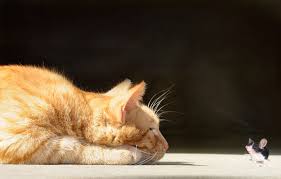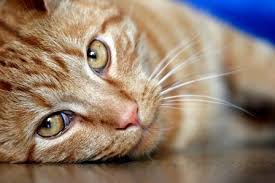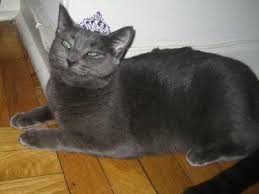What Is The Best Cat Breed For Catching Mice

Pet Parents' Choice Awards For the Cat Lover Cat Lovers Go Green Toys, Puzzles & Games Travel With Your Cat Flea & Tick Center Flea & Tick Guide Cat Nutrition & Diet Why You Should Adopt How to Adopt a Cat 5 Things to Know Best Cat Breeds for Pest Control We’ve asked Hope Gonano, a Cat Fanciers’ Association allbreed judge, to help us round up the top 10 cat breeds for pest control.10 Facts About Cats And MiceIn ancient Egypt, the cat was first valued for devouring rodents that infested the village grain bins. Eventually, people began to admire their other traits, and cats became helpers as well as beloved members of the family. But as they became “domesticated,” prey drive and hunting skills declined, and today not all cats are automatically suited for “mousing.” So, how do you find a modern-day cat with an old soul for hunting?Most agree breed doesn’t matter as much as temperament and upbringing. The popular Maine Coon, originally bred for mousing, has pretty much lost her reputation as a hunter, and breeds like Manx, Persian, and Ragdoll are said to be too “mellow” or “laid back.”

Breeds that do seem to have a reputation for mousing include the American Shorthair, British Shorthair, and American Polydactyl.
Curtains 80 Inches WideAthletic breeds like the Bengal and Abyssinian may have the stamina for hunting, but that alone doesn’t guarantee a “good mouser.”
Modern Art Deco Black Strip Wall MirrorMany owners say their best mousers are “pound kitties,” who were adopted from a shelter.
Yellow Kitchen Curtains ValancesHere are some things to consider:Does the cat carry toys in its mouth — and look like she “owns” the toy?Is the cat curious, active, or persistent? Some enjoy batting at toys for a few minutes before losing interest. Good mousers have longer attention spans when hunting. Interestingly, a good hunter will abandon an effort that’s gone on too long — saving energy for the next opportunity.

Females may be better mousers than males, possibly because they teach their kittens to hunt; however, many famous mousers in history were male.Many people feel a slightly older cat may be a better choice than a kitten who is still honing her hunting skills.Make sure your cat is spayed or neutered. It’s healthier, prevents overpopulation, and a “fixed” cat can focus on things other than mating.If your mouse problem is outside or in a barn, consider adopting a feral or semi-feral cat from a shelter. Many will provide a spayed or neutered and vaccinated cat at little or no cost. These cats probably won’t become true “pets,” but when you provide supplemental food, water, warmth, and safety, many will stay around for years. In a house, the mere presence of a cat can deter mice.Never adopt a cat just to kill mice; if your problem is serious, consider consulting pest control or professional extermination services.A well-fed cat will hunt for entertainment and catch more prey than a hungry cat;

never withhold food from any cat in your care.Reward your cat for leaving you a “present,” even if it’s disgusting…and keep plastic gloves handy for disposal.Cats who hunt are more susceptible to certain diseases. Experts recommend you worm your cat every six months, research the health concerns in your area (like hantavirus), and have a good relationship with your vet.Cats are wonderful companions, as our ancestors in the East knew. Having a cat who is also a good mouser is just an added blessing.Choosing a Gifted MouserAloof demigod or cuddly cutie-pie, your cat is descended from countless generations of fierce predators. Under the right circumstances, almost any cat will kill a mouse. However, some cats seem to live for the hunt while others prefer to wait for the occasional mouse to stumble directly into their food bowls. If you live in an area where mice and other rodents are a problem, here are a few guidelines you can use to find a cat who will eagerly seek out such prey.

What to Look for in a Mousing Cat: 1. Observe the Cat, Not the Breed2. Watch for Hunting Behavior3. Know Where the Cat Came From What Makes a Good Hunting Cat?When choosing a good mouser, breed matters least. While certain types of cats, including Maine Coons and American Shorthair cats, are known as good mousers, there is tremendous individual variation within each breed. Look at the individual cat. If possible, look for a cat who already hunts or displays hunting behavior. All cats are born with an instinct to chase, but that instinct must also be enabled and encouraged by the environment if it is to develop into skillful hunting. If a cat is going to actually kill (or even eat) its prey, that behavior must be taught. Kittens' mothers are the ones who teach them to hunt, so if possible, find out more about where the cat came from. You can sometimes test a cat's interest in hunting by playing with the cat: if it shows intense and sustained interest in the toy (chasing, pouncing, biting, etc.), that cat might be a good hunter, but unless that interest was encouraged by the cat's mother, it may not have developed into a skill.

How Kittens Learn to Hunt: A Skill Honed with Practice and PlayWatch as these kittens learn hunting skills through games and practice. As they begin to hunt, you may notice that their play looks a lot like the games you've seen more urban kittens and cats enjoy with their toys. The playful stalking, pouncing, and wrestling of kittens is practice for the hunt. Cats That Will Kill MiceIt's All Fun and Games Unless You're a Large and Juicy Rat Whether you're choosing a kitten or an adult cat, look for one who plays fiercely. When kittens play, they are honing their skills as little hunters. Watch for cats of any age who "stalk" their toys, or bite them and shake them vigorously. This type of play mimics more serious hunting behavior, and is a good indication that a cat will seek out and kill mice. Hunting Training Tools for Your CatAll that capering and pouncing that looks so cute to us is, in fact, the practice regimen of a highly skilled assassin. A kitten or cat playing with a toy is flexing her huntress muscles, honing her killing skills, and keeping her predatory instincts finely tuned.

Keep your cat playing, and she'll continue to rain terror down upon your rodent population well into her old age.If your cat lives indoors part time, I recommend investing in some cat toys to keep her in fighting condition. Vary the toys and introduce new ones now and then to pique her interest. A squeaky, furry little mouse is perfect for encouraging your kitty to pounce on the real ones. Finally, for your own comfort, keep fierce hunting games (excellent for keeping that killer instinct honed!) centered around toys, not fingers. It's cute when a tiny kitten bats at your ankles or gnaws on a finger but it's not so cute a year later, when your twelve pound ninja cat attacks before you've had your first cup of coffee! Where to Find a Good MouserIf you live in or near a rural area, look for a farm with a litter of barn cats. Plus, many states have barn cat relocation programs, so check the Internet for an organization near you. These kittens will have learned to hunt by watching their mothers, and are more likely to have a few kills under their own belts.

An adult barn cat is an ideal choice if you can provide it with an appropriate environment, but may not adjust well to city life. Your local animal shelter is probably overflowing with cats. Most animal shelters will cheerfully allow you to interact with the cats in order to make a good adoption decision. When you go, take a toy mouse with you and see how the cats react to it. In a cat of any age, look for lots of energy and a playful disposition. While shelter fees can be fairly steep, they generally include vaccinations and spaying or neutering. Will Spaying or Neutering My Cat Kill Its Killer Instinct? The idea that spaying or neutering your cat will reduce its desire to hunt is a myth. Unaltered cats can produce two to three litters of kittens a year, and those kittens will soon be bearing litters of their own. With that many cats around, you'll have to bring in the bears to control the cats. To avoid replacing your rodent problem with a cat problem, spay or neuter your cat!

If you can't afford to pay to have your kitty spayed or neutered right away, look for a free or low cost program rather than putting it off. How to Take Care of a Mousing CatBe sure to keep your cat's vaccinations current, especially if it's an outdoor cat, and extra-especially if that cat is a hunter. While rodents are a natural part of a cat's diet, they can carry parasites and diseases. For your cat's health, never use poison for rodent control. In addition to the risk of your cat directly consuming some of the poison, your cat can be poisoned by eating a rodent that has consumed poisoned bait. More About MousersHere are links to more information, speculation, and fiercely-held opinion about hunting cats. What Cat is the Best Mouser?.The American ShorthairLearn more about the American Shorthair, a breed with a standout reputation as a good mouser.Predatory Behavior of CatsAn explanation of the predatory drives that motivate your cat, including information about how kittens learn to hunt.

Six Adorable Cat Behaviors with Shockingly Evil ExplanationsAwww, isn't that sweet? Hrm, well, maybe not...How to Train a Cat to Be Outdoor Safe and a Good Rodent CatcherNo hunting-savvy barn cats to be found in your area? No worries... most cats can learn to hunt. Here's some great info from wikiHow on teaching your cat to be a safe outdoor hunter. Getting a Mouse-Hunting CatBefore you bring home your cute little killing machine, consider your options carefully. A good mouser will certainly take care of your rodent problem, but a cat is more than pest control! Make sure you're ready for a pet. Death by cat is ugly and painful, and many cats love to flaunt their kills. While the only evidence of my own cat's hunting is the occasional glimpse of her darting under the house with a mouse in her mouth, my coworker's cat is less discrete and she frequently finds little corpses in her bathtub. If you have too tender a heart to be comfortable with this, do yourself, some mice, and the cat a favor and consider a non-lethal trap instead.

Non-lethal traps or deterrents can be very effective with all but the most severe rodent infestations. Do You Really Want a Cat?If you have a temporary rodent problem, a hunting cat will clear it up in no time. Unless you live in a rural area with a lot of rodents or your neighbors have been stockpiling their garbage since 1963, you will soon have a rodent-free home. Will you still have a place in your home for a cat? If not, choose a different solution for pest control. What if My Cat Shows No Interest in Catching Mice?Not all cats show interest in killing rodents. Some are too well-fed to be interested in working for food, others just don't seem to have the "killer instinct." Does your cat stalk and kill rodents, toys, and the occasional bug, or is he or she a sophisticated urban cat and above that sort of thing? What kind of cat do you have?Is your cat a lover or a fighter? Even if mice were dancing all over her, my cat would not bat an eye. My cat is so uninterested in hunting that even if I stopped feeding her, it would never occur to her to eat a mouse.